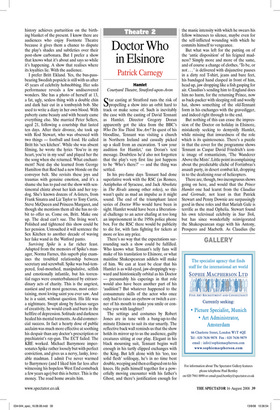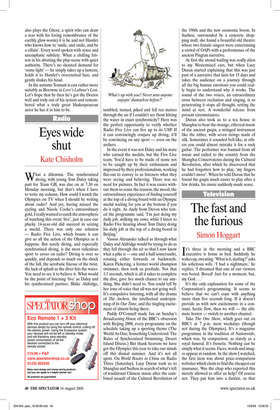Theatre 2
Doctor Who in Elsinore
Patrick Carnegy
Hamlet
Courtyard Theatre, Stratford-upon-Avon Star casting at Stratford runs the risk of propelling a show into an orbit hard to track or make sense of. Such is inevitably the case with the casting of David Tennant as Hamlet. Director Gregory Doran apparently got the idea from the BBC’s Who Do You Think You Are? In quest of his bloodline, Tennant was visiting a church in Northern Ireland and casually picked up a skull from an excavation. ‘I saw your audition for Hamlet,’ ran Doran’s text message. Doubtless he’d also not forgotten that the play’s very first line just happens to be ‘Who’s there?’ — and the thing was settled.
In his pre-fame days Tennant had done superlative work with the RSC (as Romeo, Antipholus of Syracuse, and Jack Absolute in The Rivals among other roles), so this wasn’t quite as mad an impulse as it might sound. The end of the triumphant latest series of Doctor Who would have been in sight. Hamlet would have been a liberational challenge to an actor chafing at too long an imprisonment in the 1950s police phone box. For the RSC there would be publicity to die for, with fans fighting for tickets at more or less any price.
There’s no way that the expectations surrounding such a show could be fulfilled. Who knows what Tennant’s telly fans will make of his translation to Elsinore, or what mainline Shakespearean addicts will make of him. We can at least be clear that his Hamlet is as wild-eyed, jaw-droppingly wayward and histrionically orbital as his Doctor — presumably his caperings in that role would also have been another part of his ‘audition’? But whatever happened to the consummate skills of the actor who once only had to raise an eyebrow or twitch a corner of his mouth to make you smile or convulse you with laughter?
The settings and costumes by Robert Jones are in tune with a bang-up-to-the minute Elsinore to suit its star smartly. The reflective back wall reminds us that the show holds its mirror up to us the audience, guilty creatures sitting at our play. Elegant in his black mourning suit, Tennant begins well enough in his tartly clipped exchanges with the King. But left alone with his ‘too, too solid flesh’ soliloquy, he’s in no time bent double, weeping and then collapsed on to his knees. He pulls himself together for a powerfully moving encounter with his father’s Ghost, and there’s justification enough for the manic intensity with which he swears his fellow witnesses to silence, maybe even for the self-inflicted wounding with which he commits himself to vengeance.
But what was left for the putting on of the ‘antic disposition’ of his feigned madness? Simply more and more of the same, and of course a change of clothes. ‘To be, or not ... ’ is delivered with disjunctive pauses in a dirty red T-shirt, jeans and bare feet, his bandaged hand clasped in front of him, head up, jaw dropping like a fish gasping for air. Claudius’s sending him to England does him no harm, for the returning Prince, now as back-packer with sleeping roll and woolly hat, shows something of the old-Tennant form in his exchanges with the gravedigger, and indeed right through to the end.
But nothing of this can erase the impression of the Doctor on holiday in Elsinore, mistakenly seeking to demystify Hamlet, while missing that inwardness of the role which is its quintessence. There’s a puzzle in that the cover for the programme shows Tennant as Caspar David Friedrich’s iconic image of romanticism, ‘The Wanderer Above the Mists’. Little point in complaining about the predictable cliché of Fortinbras’s assault party, in desert combat kit, dropping in to the deafening roar of helicopters.
There are, though, two incongruous shows going on here, and would that the Prince Hamlet one had learnt from the Claudius and Gertrude, not least in that Patrick Stewart and Penny Downie are surpassingly good in these roles and that Mariah Gale is terrific as the mad Ophelia. Stewart found his own televisual celebrity in Star Trek, but has since wonderfully reinvigorated the Shakespearean stage with his Antony, Prospero and Macbeth. As Claudius (he also plays the Ghost, a spirit who can draw a tear with his loving remembrance of the earthly glow-worm) it is he and not Hamlet who knows how to ‘smile, and smile, and be a villain’. Every word spoken with sense and unemphatic subtlety. What a chilling frisson in his aborting the play-scene with quiet authority. There’s no shouted demand for ‘some light’ — he simply takes up a lantern, holds it to Hamlet’s overexcited face, and gently shakes his head.
In the autumn Tennant is cast rather more suitably as Berowne in Love’s Labour’s Lost. Let’s hope that by then he’s got the Doctor well and truly out of his system and remembered what a truly great Shakespearean actor he has it in him to be.



























































 Previous page
Previous page